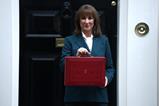In comparing spiritual growth to economic growth, George Pitcher comes to an unexpected conclusion

What to do about Lent? It’s a question that preoccupies parish priests and not a few of their congregants as we approach the last Sunday before next week’s Ash Wednesday, when the penitential season begins with the sombre liturgical reminder that “you are dust and to dust you shall return.”
It’s become a commonplace to say that Lent shouldn’t just be about fasting, giving up chocolate or booze for the 40 days (with formal breaks from the fast for Sundays). It should be about doing more that’s worthwhile – like reading scripture or theology, learning a new way of meditating, working at a food bank. Lent, it is said, is about finding time to be spiritual and, in doing so, closer to God.
On this model, it’s about spiritual growth. That’s true. But it’s so true that it’s a truism. And another word for a truism is a platitude. There’s a danger of ticking the spiritual growth box in Lent in the same way as we might join a gym in January. The intent is sound, but it doesn’t do us any good in the long run.
I want to make a case this year for not trying to grow spiritually in Lent. In a way, I want to shrink spiritually, strip down to some honest essentials, lose some of the fat of faith. And I wonder whether a parallel with economics can show us the way.
There is an economic theory that has been fashionable in liberal circles for some decades, called “degrowth”. It posits that we need, as a matter of necessity, to overcome what is often called our “fetish” for economic growth; that such growth is inevitably finite, it destroys the planet, polarises the rich and the poor and, ultimately, makes everyone unhappy.
Unlimited spiritual growth can lead to certainty – and that way religious madness lies
Liz Truss was (and, for some, still is) the goddess of growth. Her shortest-ever, 44 day prime ministership of the UK was launched and crashed on a lemming-like rush for economic growth. The theory was that if you make the rich richer by cutting their taxes, then they will invest in Britain and that wealth will trickle down through the economy, stimulating growth.
In her efforts to achieve this, she crashed the financial markets, made mortgages unaffordable and sparked a massive cost-of-living crisis. Truss somewhat devalued the idea of the pursuit of growth. You might think that this would have raised the currency of degrowth economics.
Not a bit of it. Right-wing commentators go berserk over degrowth. It’s as if it’s the enemy of all that is essentially Conservative. Because only by consuming more, apparently, can we create more jobs, raise wages and collect more tax. But it’s as if a rational response to the suggestion that we buy less stuff can be: “Then how will we be able to buy more stuff?” The whole point of degrowth is that it isn’t growth.
That’s the principle that might be analogous with Lent. At one level, there is the straightforward idea that economic degrowth might be something holy and wholesome in itself. What would the world look like if we all consumed, say, 25 per cent less in Lent – less fossil fuel, less imported food, less stuff generally? What might be the effect on energy and food prices? I don’t know. But I hazard a guess that things wouldn’t be worse and might be quite a lot happier.
The real comparison to be made, though, is between economic and spiritual policy. Is there a positive link to be made with degrowth? There may be a category mistake to be observed here, in that economic growth might be finite, while spiritual growth could/should be limitless.
But there may be similarities too. If Trussonomics made us notice that an economic policy which assumes that growth is always a good thing may not itself be a good thing, then a spiritual policy which assumes that spiritual growth is always beneficial might, at least, be questionable.
It’s as if, in the face of a red-faced and white-knuckled biblical commentator, we suggest that we might be suffering a surfeit of spirituality and could do with a bit of degrowth and are met with the retort: “Then how will we be able to gain more spirituality?” There is a religious fundamentalism at play, as well as the economic equivalent, in both markets.
This is, I suppose, the case that is often made for some Lenten decluttering, which is perhaps a less sensitive word than degrowth. But I’d still want to make a case for the latter.
My (and our parish’s) Lent book is Paul Dominiak’s The Falling of Dusk, in which he makes the case for the health-giving qualities of doubt in considering the gospels’ seven last words of the Christ from the cross.
Unlimited spiritual growth can lead to certainty – and that way religious madness lies. Doubt, by contrast, is faith’s friend. So two conclusions: Spiritual degrowth to welcome doubt in Lent is healthy. And, secondly, politicians could benefit from a little doubt, as well as faith, in their working lives.





































No comments yet